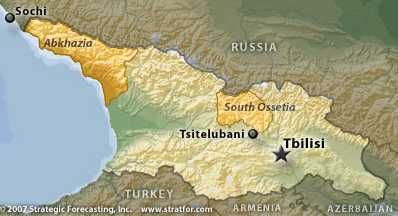 On August 8, 2008 Georgia under President Mikhail Saakashvili at the instigation of the Bush administration and PNAC neocons launched a major military offensive to retake the breakaway provinces of South Ossetia and Abkhazia.
On August 8, 2008 Georgia under President Mikhail Saakashvili at the instigation of the Bush administration and PNAC neocons launched a major military offensive to retake the breakaway provinces of South Ossetia and Abkhazia.
Russia responded by sending tanks and troops into the area and rapidly broke Georgia’s offensive, forcing Georgian forces to retreat and abandon their aggresssion against the two provinces, and in the process announced to the world that the geopolitical balance of power had shifted and had been shifting for some time while Bush has had the US bogged down in quicksand in Iraq.
South Ossetia and Abkhazia have both moved to request UN and international recognition of their independence from Georgia, and South Ossetians have announced their intention to reunite with North Ossetia under the Russian Federation.
The McCain campaign, the Bush Administration, and US media have turned the situation and reality on it’s head with continual rhetoric condemning Russia for “aggression” and attempts to encircle Russia with a “missile defense shield”, when it was in reality Georgia supported by Washington and the neocons that had committed the aggression.
Obama has picked up on the McCain narrative and has also condemned Russia calling them the “aggressor”, and is now fighting the election on McCain’s terms trying to show that he is as “tough” or tougher than McCain on “national security”.
Andrei P. Tsygankov, Professor of Political Science and International Relations at San Francisco State University explains in this Real News video, and thinks that Obama will lose the election to McCain unless he rapidly differentiates himself from McCain over “national security” in the last few weeks of the campaign.
September 6, 2008 – 4 min 18 sec
Andrei Tsygankov: Obama must rethink Russia policy or risk losing election on national security issuesAndrei P. Tsygankov is Professor at the departments of Political Science and International Relations at San Francisco State University. He teaches Russian/post-Soviet, comparative, and international politics since August 2000. A Russian native, Tsygankov is a graduate of Moscow State University (Candidate of Sciences, 1991) and University of Southern California (Ph.D., 2000). Tsygankov published widely in Western and Russian academia. In the West, he co-edited New Directions in Russian International Studies (2004), and he published Pathways after Empire: National Identity and Foreign Economic Policy in the Post-Soviet World (2001), Whose World Order? Russia’s Perception of American Ideas after the Cold War (2004), and Russia’s Foreign Policy: Change and Continuity in National Identity (2006), as well as many journal articles. In Russia, his best known books are Russian Science of International Relations (2005, co-edited with Pavel Tsygankov, also published in Germany and China) and Sociology of International Relations (2006, co-authored with Pavel Tsygankov, also published in China).

5 comments
Skip to comment form
Author